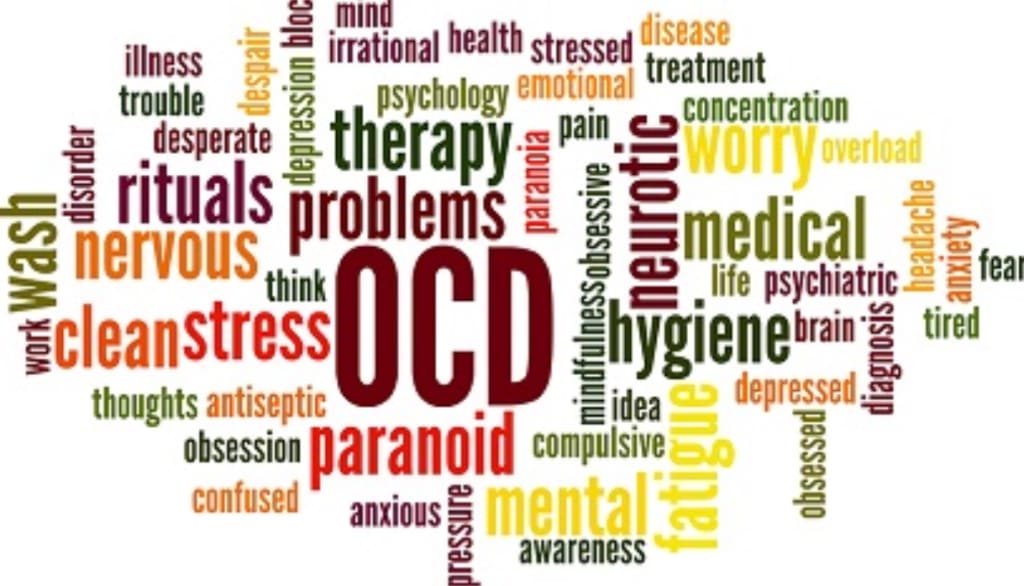
The television series Friends put a funny spin on the term and even made it popular to have OCD. Suddenly, everyone who loved cleaning, claimed they had OCD without really fully understanding the disorder.
OCD is NOT a love for cleaning.
OBSESSIVE—COMPULSIVE—DISORDER. Let's take the time to examine what this really means.
OCD is a mental disorder (more specifically—an anxiety disorder) where people feel the need to check things repeatedly, perform certain routines repeatedly (called 'rituals'), or have certain thoughts repeatedly (called 'obsessions'). People who suffer with OCD are unable to control their thoughts or activities for more than a short period of time. These activities occur to such a degree that the person's daily life is negatively affected.
The disorder is also associated with an increased risk of suicide.
Once the disorder is better understood, it's easy to see that those with the disorder certainly don't love it. It causes them great distress and can leave them feel trapped, only ever being temporarily relieved once a ritual or obsession is performed, before the cycle starts again. It's like being on a treadmill and getting exhausted, but being unable to get off or stop the machine. There seems to be no freedom of choice and those suffering an OCD feel that they are slaves to their thoughts or actions.
Obsessive thoughts will exist despite efforts to ignore them and usually stem from a person’s fears, needs, aggression, or unwanted thoughts.
A Compulsion is usually triggered by an obsession and is a repetitive behavior that the OCD sufferer feels strong urges to perform, with the belief that doing so will reduce or prevent their anxiety or fears of something bad happening.
In Schema Therapy, patients with an Emotional Inhibition schema frequently meet the diagnostic criteria for OCD. Clients with an Emotional Inhibition schema present as emotionally constricted and are excessively inhibited about discussing and expressing their emotions. They can come across as cold or reserved and hold back expressing affection or caring in addition to attempt restraining their aggressive urges. They place a very high value on self-control, even at the cost of intimacy and they fear that if they should let go of their emotions, they might lose complete control.
In addition to their emotional restriction, they often lack intimacy and play in their relationships, and are rigid and inflexible.
Patients with OCD can also suffer with an Unrelenting Standards or Hypercritical schema. This is when someone has the underlying belief that they must strive to meet very high internalised standards of behaviour—usually to avoid criticism. They typically have feelings of pressure and struggle to slow down in their hypercriticalness towards themselves or others.
People with OCD will often try to avoid intimate relationships altogether or act emotionally demanding with partners and close friends. Some can spend inordinate amounts of time trying to be perfect, or avoid or procrastinate in situations where performance will be judged.
Treating OCD
There are many successful ways of treating OCD. Cognitive therapies like Cognitive Behavioural Therapy (CBT) and Schema Therapy along with Emotional Regulation Therapies work well. These therapies will look at what is causing the fear at the root of the problem and help you find ways of changing the behaviour.
A therapist will help you challenge your daily thoughts and routines whilst addressing the underlying issue.
If you suspect that you might have OCD, it is best to go and see someone who can offer help. There is still also a negative stigma around OCD and people who don’t suffer from it, might not fully understand the stress it can cause.
Family members of those with OCD also often suffer a great deal. Imagine a child living in fear of making a mess because they can see the distress it can cause to a parent living with ODC.
The great thing is that OCD is treatable and you don’t have to suffer. Ask your GP for a referral to recommend a service you can contact for help.
About the Creator
Sonica M
Hi, I am a qualified Counsellor, mother, writer and author. I write about parenting, relationships, psychology and other things I find interesting.






Comments
There are no comments for this story
Be the first to respond and start the conversation.